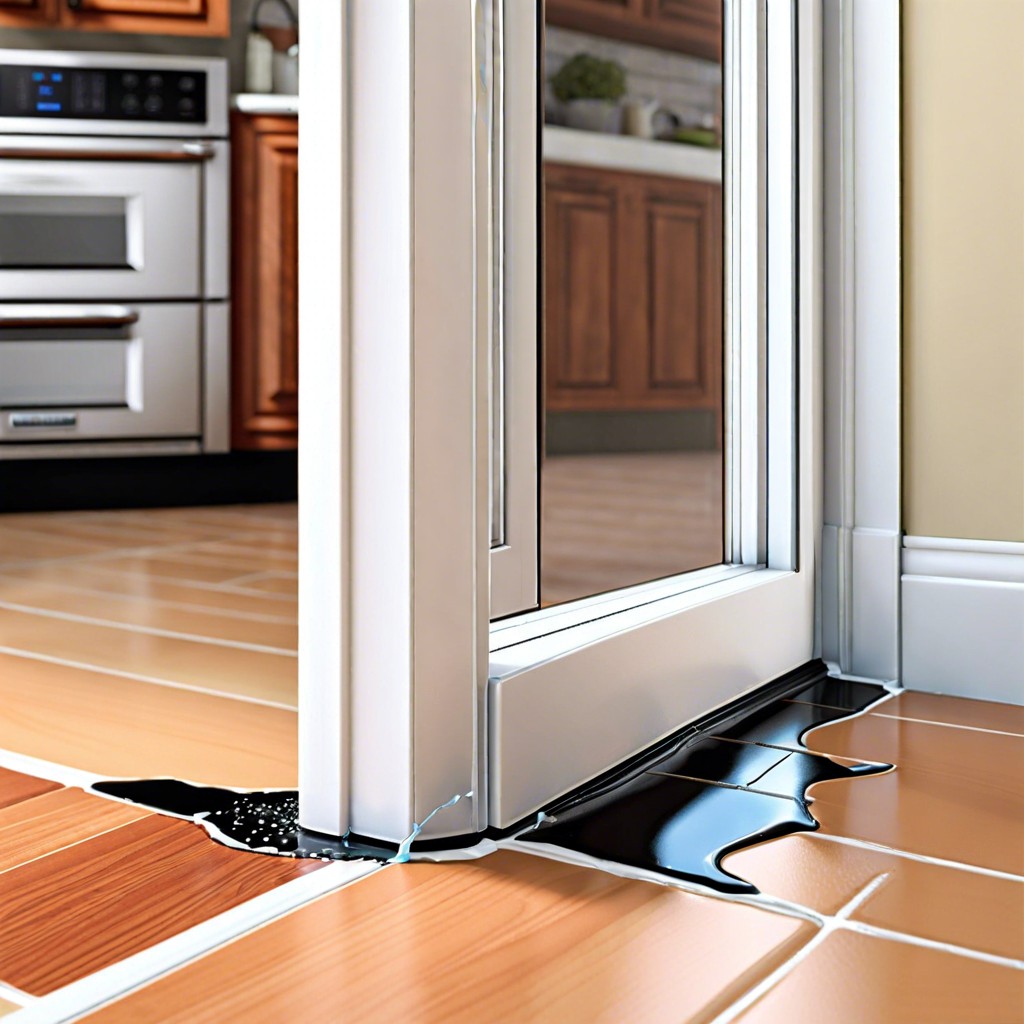Last updated on
Learn effective strategies to eliminate ants from your kitchen with simple, proven methods.
Key takeaways:
- Seal Entry Points.
- Maintain a Clean Kitchen Environment.
- Use Natural Repellents Like Cinnamon and Peppermint Oil.
- Apply Diatomaceous Earth to Affected Areas.
- Consider Professional Pest Control for Severe Infestations.
What's Inside
Seal Entry Points

Those tiny invaders make their way in through the smallest cracks and crevices. A good old-fashioned visual inspection can do wonders. Run your eyes along baseboards, windows, and doors; if you spot any gaps, it’s time to fortify your defenses. Clear caulk can become your new best friend for sealing these entryways discreetly. Don’t overlook where utility pipes enter your home — a dab of caulk or foam sealant can block an ant highway.
Remember, ants are master contortionists; if a pencil can slide into a crack or opening, it’s big enough for them. Weather-stripping and door sweeps are not just for weather; they’re a ninja move against those six-legged intruders. Done correctly, these simple steps will send ants marching to someone else’s kitchen.
Maintain a Clean Kitchen Environment
Crumbs and spills are like a dinner bell for ants. Keeping surfaces spotless cuts off their food supply. Wipe countertops immediately after use and sweep floors daily to remove food particles. Store ripe fruit in the fridge and tightly seal all food containers. Don’t forget to regularly take out the trash and clean the can to prevent a buildup of residue that attracts a scouting ant.
Dishes left in the sink are an open invitation for an ant party. Wash them promptly, or at least immerse them in soapy water. Also, pay attention to hidden areas where food bits linger, like the microwave interior or beneath appliances. A deep clean now can save you a headache later.
Moisture is another draw for these six-legged intruders. Fix leaky taps and ensure that sinks and countertops are dry before calling it a night. Remember, an ant-free kitchen is as much about denying them sustenance as it is about cleanliness.
Use Natural Repellents Like Cinnamon and Peppermint Oil
Cinnamon is more than just a delightful spice for your morning latte; it’s also an ant deterrent. Its strong scent masks the trails ants use to navigate, leaving them disoriented. Sprinkle a line of ground cinnamon at potential entry points or where you notice ant traffic.
Peppermint oil takes the upper hand as a dual-purpose solution. It not only freshens up the room with its crisp aroma but also stands as a barrier ants are loath to cross. Soak a cotton ball in peppermint essential oil and place it in areas where ants are prevalent. Reapply every few days to keep the area fragrant and ant-free.
Anecdotal evidence suggests these natural remedies can tell ants it’s time to pack up and move out. They are safe around children and pets, a bonus for families and individuals preferring not to rely on harsh chemicals. Plus, they contribute to a welcoming kitchen environment—not just for guests, but for you as the master of your culinary domain. Keep up the good work, and the only guests you’ll be hosting are the kind you actually invite.
Apply Diatomaceous Earth to Affected Areas
Diatomaceous earth is a powder made from the fossilized remains of tiny aquatic organisms called diatoms. Their skeletons are made of a natural substance called silica, which works wonders in pest control.
Wondering how this fine dust tackles your ant issue? Here’s the scoop: when ants traverse over diatomaceous earth, the abrasive powder damages their exoskeletons, leading to dehydration. It’s like walking on a bed of microscopic thorns for these critters.
Simplicity is key when applying diatomaceous earth. Just sprinkle a thin layer around areas where ants are spotted. That could be baseboards, behind appliances, or any little nook where these pesky invaders might congregate.
Remember that diatomaceous earth only works when dry, as moisture reduces its effectiveness. So, applying it under the sink might not be your best move if it’s a splash zone. And reapply after cleaning or any time the powder gets wet.
Here’s a pinch of caution: opt for food-grade diatomaceous earth, which is safe for use around the kitchen. Avoid breathing in the dust when you’re spreading the powder – it’s gentle on the environment but not so much on your lungs.
Consider Professional Pest Control for Severe Infestations
If your ant problem seems to laugh in the face of all your efforts, calling in the pros might be your best bet. Pest control experts wield an arsenal of weapons against these six-legged invaders that go beyond the typical traps and sprays found in stores.
For one, they can determine the species of ant, cracking the code on the best way to send them packing. Knowing whether you’re dealing with grease ants or sugar ants can make all the difference.
Secondly, they have access to commercial-grade treatments with staying power far beyond DIY solutions. This means that not only will the current invaders be evicted, but future uninvited guests get the memo to steer clear of your kitchen.
Remember, while the DIY route can be effective for minor issues, a severe infestation requires firepower and finesse that only professionals offer. They have a trained eye for hidden nests and a strategic mind for preventative measures, ensuring your kitchen becomes a no-ant zone for good.




